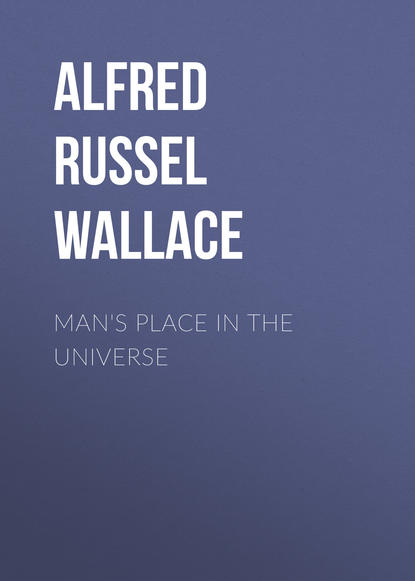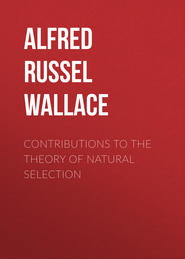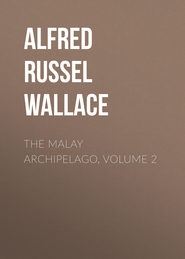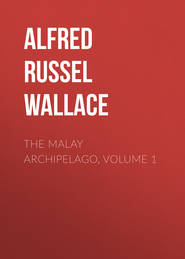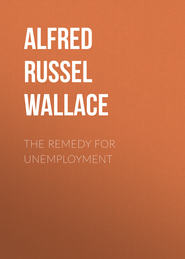По всем вопросам обращайтесь на: info@litportal.ru
(©) 2003-2024.
✖
Man's Place in the Universe
Автор
Год написания книги
2018
Настройки чтения
Размер шрифта
Высота строк
Поля
The conclusions which I claim to have shown to have enormous probabilities in their favour are—
(4) That no other planet in the solar system than our earth is inhabited or habitable.
(5) That the probabilities are almost as great against any other sun possessing inhabited planets.
(6) That the nearly central position of our sun is probably a permanent one, and has been specially favourable, perhaps absolutely essential, to life-development on the earth.
These latter conclusions depend upon the combination of a large number of special conditions, each of which must be in definite relation to many of the others, and must all have persisted simultaneously during enormous periods of time. The weight to be given to this kind of reasoning depends upon a full and fair consideration of the whole evidence as I have endeavoured to present it in the last seven chapters of this book. To this evidence I appeal.
This completes my work as a connected argument, founded wholly on the facts and principles accumulated by modern science; and it leads, if my facts are substantially correct and my reasoning sound, to one great and definite conclusion—that man, the culmination of conscious organic life, has been developed here only in the whole vast material universe we see around us. I claim that this is the logical outcome of the evidence, if we consider and weigh this evidence without any prepossessions whatever. I maintain that it is a question as to which we have no right to form a priori opinions not founded upon evidence. And evidence opposed to this conclusion, or even as to its improbability, we have absolutely none whatever.
But, if we admit the conclusion, nothing that need alarm either the scientific or the religious mind necessarily follows, because it can be explained or accounted for in either of two distinct ways. One considerable body, including probably the majority of men of science, will admit that the evidence does apparently lead to this conclusion, but will explain it as due to a fortunate coincidence. There might have been a hundred or a thousand life-bearing planets, had the course of evolution of the universe been a little different, or there might have been none at all. They would probably add, that, as life and man have been produced, that shows that their production was possible; and therefore, if not now then at some other time, if not here then in some other planet of some other sun, we should be sure to have come into existence; or if not precisely the same as we are, then something a little better or a little worse.
The other body, and probably much the largest, would be represented by those who, holding that mind is essentially superior to matter and distinct from it, cannot believe that life, consciousness, mind, are products of matter. They hold that the marvellous complexity of forces which appear to control matter, if not actually to constitute it, are and must be mind-products; and when they see life and mind apparently rising out of matter and giving to its myriad forms an added complexity and unfathomable mystery, they see in this development an additional proof of the supremacy of mind. Such persons would be inclined to the belief of the great eighteenth century scholar, Dr. Bentley, that the soul of one virtuous man is of greater worth and excellency than the sun and all his planets and all the stars in the heavens; and when they are shown that there are strong reasons for thinking that man is the unique and supreme product of this vast universe, they will see no difficulty in going a little further, and believing that the universe was actually brought into existence for this very purpose.
With infinite space around us and infinite time before and behind us, there is no incongruity in this conception. A universe as large as ours for the purpose of bringing into existence many myriads of living, intellectual, moral, and spiritual beings, with unlimited possibilities of life and happiness, is surely not more out of proportion than is the complex machinery, the life-long labour, the ingenuity and invention which we have bestowed upon the production of the humble, the trivial, pin. Neither is the apparent waste of energy so great in such a universe, comparatively, as the millions of acorns, produced during its life by an oak, every one of which might grow to be a tree, but of which only one does actually, after several hundred years, produce the one tree which is to replace the parent. And if it is said that the acorns are food for bird and beast, yet the spores of ferns and the seeds of orchids are not so, and countless millions of these go to waste for every one which reproduces the parent form. And all through the animal world, especially among the lower types, the same thing is seen. For the great majority of these entities we can see no use whatever, either of the enormous variety of the species, or the vast hordes of individuals. Of beetles alone there are at least a hundred thousand distinct species now living, while in some parts of sub-arctic America mosquitoes are sometimes so excessively abundant that they obscure the sun. And when we think of the myriads that have existed through the vast ages of geological time, the mind reels under the immensity of, to us, apparently useless life.
All nature tells us the same strange, mysterious story, of the exuberance of life, of endless variety, of unimaginable quantity. All this life upon our earth has led up to and culminated in that of man. It has been, I believe, a common and not unpopular idea that during the whole process of the rise and growth and extinction of past forms, the earth has been preparing for the ultimate—Man. Much of the wealth and luxuriance of living things, the infinite variety of form and structure, the exquisite grace and beauty in bird and insect, in foliage and flower, may have been mere by-products of the grand mechanism we call nature—the one and only method of developing humanity.
And is it not in perfect harmony with this grandeur of design (if it be design), this vastness of scale, this marvellous process of development through all the ages, that the material universe needed to produce this cradle of organic life, and of a being destined to a higher and a permanent existence, should be on a corresponding scale of vastness, of complexity, of beauty? Even if there were no such evidence as I have here adduced for the unique position and the exceptional characteristics which distinguish the earth, the old idea that all the planets were inhabited, and that all the stars existed for the sake of other planets, which planets existed to develop life, would, in the light of our present knowledge, seem utterly improbable and incredible. It would introduce monotony into a universe whose grand character and teaching is endless diversity. It would imply that to produce the living soul in the marvellous and glorious body of man—man with his faculties, his aspirations, his powers for good and evil—that this was an easy matter which could be brought about anywhere, in any world. It would imply that man is an animal and nothing more, is of no importance in the universe, needed no great preparations for his advent, only, perhaps, a second-rate demon, and a third or fourth-rate earth. Looking at the long and slow and complex growth of nature that preceded his appearance, the immensity of the stellar universe with its thousand million suns, and the vast æons of time during which it has been developing—all these seem only the appropriate and harmonious surroundings, the necessary supply of material, the sufficiently spacious workshop for the production of that planet which was to produce first, the organic world, and then, Man.
In one of his finest passages our great world-poet gives us his conception of the grandeur of human nature—'What a piece of work is man! How noble in reason! How infinite in faculty! In form and moving, how express and admirable! In action how like an angel! In apprehension how like a god!' And for the development of such a being what is a universe such as ours? However vast it may seem to our faculties, it is as a mere nothing in the ocean of the infinite. In infinite space there may be infinite universes, but I hardly think they would be all universes of matter. That would indeed be a low conception of infinite power! Here, on earth, we see millions of distinct species of animals, millions of different species of plants, and each and every species consisting often of many millions of individuals, no two individuals exactly alike; and when we turn to the heavens, no two planets, no two satellites alike; and outside our system we see the same law prevailing—no two stars, no two clusters, no two nebulæ alike. Why then should there be other universes of the same matter and subject to the same laws—as is implied by the conception that the stars are infinite in number, and extend through infinite space?
Of course there may be, and probably are, other universes, perhaps of other kinds of matter and subject to other laws, perhaps more like our conceptions of the ether, perhaps wholly non-material, and what we can only conceive of as spiritual. But, unless these universes, even though each of them were a million times vaster than our stellar universe, were also infinite in number, they could not fill infinite space, which would extend on all sides beyond them, so that even a million million such universes would shrink to imperceptibility when compared with the vast beyond!
Of infinity in any of its aspects we can really know nothing, but that it exists and is inconceivable. It is a thought that oppresses and overwhelms. Yet many speak of it glibly as if they knew what it contains, and even use that assumed knowledge as an argument against views that are unacceptable to themselves. To me its existence is absolute but unthinkable—that way madness lies.
'O night! O stars, too rudely jars
The finite with the infinite!'
I will conclude with one of the finest passages relating to the infinite that I am acquainted with, from the pen of the late R.A. Proctor:
'Inconceivable, doubtless, are these infinities of time and space, of matter, of motion, and of life. Inconceivable that the whole universe can be for all time the scene of the operation of infinite power, omnipresent, all-knowing. Utterly incomprehensible how Infinite Purpose can be associated with endless material evolution. But it is no new thought, no modern discovery, that we are thus utterly powerless to conceive or comprehend the idea of an Infinite Being, Almighty, All-knowing, Omnipresent, and Eternal, of whose inscrutable purpose the material universe is the unexplained manifestation. Science is in presence of the old, old mystery; the old, old questions are asked of her—"Canst thou by searching find out God? Canst thou find out the Almighty unto perfection? It is as high as heaven; what canst thou do? deeper than hell; what canst thou know?" And science answers these questions as they were answered of old—"As touching the Almighty we cannot find Him out."'
The following beautiful lines—among the latest products of Tennyson's genius—so completely harmonise with the subject-matter of the present volume, that no apology is needed for quoting them here:—
(The Question)
Will my tiny spark of being
Wholly vanish in your deeps and heights?
Must my day be dark by reason,
O ye Heavens, of your boundless nights,
Rush of Suns and roll of systems,
And your fiery clash of meteorites?
(The Answer)
'Spirit, nearing yon dark portal
At the limit of thy human state,
Fear not thou the hidden purpose
Of that Power which alone is great,
Nor the myriad world, His shadow,
Nor the silent Opener of the Gate.'
INDEX
Adrianus Tollius on stone axes, 203 (#x6_x_6_i4).
Air criminally poisoned by us, 260 (#x7_x_7_i66).
Albedo explained, 162 (#x5_x_5_i24).
Algol and its companion, 39 (#x2_x_2_i2);
change of colour of, 41 (#x2_x_2_i9).
Allen, Prof. F.J., on living matter, 193 (#x5_x_5_i77);
on importance of nitrogen, 195 (#x5_x_5_i80);
on physical conditions essential for life, 196 (#x5_x_5_i81).
Alpha Centauri, nearest star, 74 (#x3_x_3_i18).
Ammonia, importance of, to life, 195 (#x5_x_5_i80).
Anaximander's cosmic theory, 2 (#x1_x_1_i82).
Angles of a minute and second, 80 (#x3_x_3_i29).
Arcturus, rapid motion of, 172 (#x5_x_5_i39).
Argument of book, summary of, 310 (#x8_x_8_i67).
Astronomers, the first, 2 (#x1_x_1_i82).
Astronomy, the new, 24 (#x1_pgepubid00013).
Astrophysics, a new science, 32 (#x1_x_1_i128).
Atmosphere, qualities requisite for life, 210 (#x6_x_6_i26);
requisite composition of, 212 (#x6_x_6_i32);
aqueous vapour in, 214 (#x6_x_6_i35);
and life, 243 (#x7_pgepubid00037);
effects of density of, 245 (#x7_x_7_i37);
(4) That no other planet in the solar system than our earth is inhabited or habitable.
(5) That the probabilities are almost as great against any other sun possessing inhabited planets.
(6) That the nearly central position of our sun is probably a permanent one, and has been specially favourable, perhaps absolutely essential, to life-development on the earth.
These latter conclusions depend upon the combination of a large number of special conditions, each of which must be in definite relation to many of the others, and must all have persisted simultaneously during enormous periods of time. The weight to be given to this kind of reasoning depends upon a full and fair consideration of the whole evidence as I have endeavoured to present it in the last seven chapters of this book. To this evidence I appeal.
This completes my work as a connected argument, founded wholly on the facts and principles accumulated by modern science; and it leads, if my facts are substantially correct and my reasoning sound, to one great and definite conclusion—that man, the culmination of conscious organic life, has been developed here only in the whole vast material universe we see around us. I claim that this is the logical outcome of the evidence, if we consider and weigh this evidence without any prepossessions whatever. I maintain that it is a question as to which we have no right to form a priori opinions not founded upon evidence. And evidence opposed to this conclusion, or even as to its improbability, we have absolutely none whatever.
But, if we admit the conclusion, nothing that need alarm either the scientific or the religious mind necessarily follows, because it can be explained or accounted for in either of two distinct ways. One considerable body, including probably the majority of men of science, will admit that the evidence does apparently lead to this conclusion, but will explain it as due to a fortunate coincidence. There might have been a hundred or a thousand life-bearing planets, had the course of evolution of the universe been a little different, or there might have been none at all. They would probably add, that, as life and man have been produced, that shows that their production was possible; and therefore, if not now then at some other time, if not here then in some other planet of some other sun, we should be sure to have come into existence; or if not precisely the same as we are, then something a little better or a little worse.
The other body, and probably much the largest, would be represented by those who, holding that mind is essentially superior to matter and distinct from it, cannot believe that life, consciousness, mind, are products of matter. They hold that the marvellous complexity of forces which appear to control matter, if not actually to constitute it, are and must be mind-products; and when they see life and mind apparently rising out of matter and giving to its myriad forms an added complexity and unfathomable mystery, they see in this development an additional proof of the supremacy of mind. Such persons would be inclined to the belief of the great eighteenth century scholar, Dr. Bentley, that the soul of one virtuous man is of greater worth and excellency than the sun and all his planets and all the stars in the heavens; and when they are shown that there are strong reasons for thinking that man is the unique and supreme product of this vast universe, they will see no difficulty in going a little further, and believing that the universe was actually brought into existence for this very purpose.
With infinite space around us and infinite time before and behind us, there is no incongruity in this conception. A universe as large as ours for the purpose of bringing into existence many myriads of living, intellectual, moral, and spiritual beings, with unlimited possibilities of life and happiness, is surely not more out of proportion than is the complex machinery, the life-long labour, the ingenuity and invention which we have bestowed upon the production of the humble, the trivial, pin. Neither is the apparent waste of energy so great in such a universe, comparatively, as the millions of acorns, produced during its life by an oak, every one of which might grow to be a tree, but of which only one does actually, after several hundred years, produce the one tree which is to replace the parent. And if it is said that the acorns are food for bird and beast, yet the spores of ferns and the seeds of orchids are not so, and countless millions of these go to waste for every one which reproduces the parent form. And all through the animal world, especially among the lower types, the same thing is seen. For the great majority of these entities we can see no use whatever, either of the enormous variety of the species, or the vast hordes of individuals. Of beetles alone there are at least a hundred thousand distinct species now living, while in some parts of sub-arctic America mosquitoes are sometimes so excessively abundant that they obscure the sun. And when we think of the myriads that have existed through the vast ages of geological time, the mind reels under the immensity of, to us, apparently useless life.
All nature tells us the same strange, mysterious story, of the exuberance of life, of endless variety, of unimaginable quantity. All this life upon our earth has led up to and culminated in that of man. It has been, I believe, a common and not unpopular idea that during the whole process of the rise and growth and extinction of past forms, the earth has been preparing for the ultimate—Man. Much of the wealth and luxuriance of living things, the infinite variety of form and structure, the exquisite grace and beauty in bird and insect, in foliage and flower, may have been mere by-products of the grand mechanism we call nature—the one and only method of developing humanity.
And is it not in perfect harmony with this grandeur of design (if it be design), this vastness of scale, this marvellous process of development through all the ages, that the material universe needed to produce this cradle of organic life, and of a being destined to a higher and a permanent existence, should be on a corresponding scale of vastness, of complexity, of beauty? Even if there were no such evidence as I have here adduced for the unique position and the exceptional characteristics which distinguish the earth, the old idea that all the planets were inhabited, and that all the stars existed for the sake of other planets, which planets existed to develop life, would, in the light of our present knowledge, seem utterly improbable and incredible. It would introduce monotony into a universe whose grand character and teaching is endless diversity. It would imply that to produce the living soul in the marvellous and glorious body of man—man with his faculties, his aspirations, his powers for good and evil—that this was an easy matter which could be brought about anywhere, in any world. It would imply that man is an animal and nothing more, is of no importance in the universe, needed no great preparations for his advent, only, perhaps, a second-rate demon, and a third or fourth-rate earth. Looking at the long and slow and complex growth of nature that preceded his appearance, the immensity of the stellar universe with its thousand million suns, and the vast æons of time during which it has been developing—all these seem only the appropriate and harmonious surroundings, the necessary supply of material, the sufficiently spacious workshop for the production of that planet which was to produce first, the organic world, and then, Man.
In one of his finest passages our great world-poet gives us his conception of the grandeur of human nature—'What a piece of work is man! How noble in reason! How infinite in faculty! In form and moving, how express and admirable! In action how like an angel! In apprehension how like a god!' And for the development of such a being what is a universe such as ours? However vast it may seem to our faculties, it is as a mere nothing in the ocean of the infinite. In infinite space there may be infinite universes, but I hardly think they would be all universes of matter. That would indeed be a low conception of infinite power! Here, on earth, we see millions of distinct species of animals, millions of different species of plants, and each and every species consisting often of many millions of individuals, no two individuals exactly alike; and when we turn to the heavens, no two planets, no two satellites alike; and outside our system we see the same law prevailing—no two stars, no two clusters, no two nebulæ alike. Why then should there be other universes of the same matter and subject to the same laws—as is implied by the conception that the stars are infinite in number, and extend through infinite space?
Of course there may be, and probably are, other universes, perhaps of other kinds of matter and subject to other laws, perhaps more like our conceptions of the ether, perhaps wholly non-material, and what we can only conceive of as spiritual. But, unless these universes, even though each of them were a million times vaster than our stellar universe, were also infinite in number, they could not fill infinite space, which would extend on all sides beyond them, so that even a million million such universes would shrink to imperceptibility when compared with the vast beyond!
Of infinity in any of its aspects we can really know nothing, but that it exists and is inconceivable. It is a thought that oppresses and overwhelms. Yet many speak of it glibly as if they knew what it contains, and even use that assumed knowledge as an argument against views that are unacceptable to themselves. To me its existence is absolute but unthinkable—that way madness lies.
'O night! O stars, too rudely jars
The finite with the infinite!'
I will conclude with one of the finest passages relating to the infinite that I am acquainted with, from the pen of the late R.A. Proctor:
'Inconceivable, doubtless, are these infinities of time and space, of matter, of motion, and of life. Inconceivable that the whole universe can be for all time the scene of the operation of infinite power, omnipresent, all-knowing. Utterly incomprehensible how Infinite Purpose can be associated with endless material evolution. But it is no new thought, no modern discovery, that we are thus utterly powerless to conceive or comprehend the idea of an Infinite Being, Almighty, All-knowing, Omnipresent, and Eternal, of whose inscrutable purpose the material universe is the unexplained manifestation. Science is in presence of the old, old mystery; the old, old questions are asked of her—"Canst thou by searching find out God? Canst thou find out the Almighty unto perfection? It is as high as heaven; what canst thou do? deeper than hell; what canst thou know?" And science answers these questions as they were answered of old—"As touching the Almighty we cannot find Him out."'
The following beautiful lines—among the latest products of Tennyson's genius—so completely harmonise with the subject-matter of the present volume, that no apology is needed for quoting them here:—
(The Question)
Will my tiny spark of being
Wholly vanish in your deeps and heights?
Must my day be dark by reason,
O ye Heavens, of your boundless nights,
Rush of Suns and roll of systems,
And your fiery clash of meteorites?
(The Answer)
'Spirit, nearing yon dark portal
At the limit of thy human state,
Fear not thou the hidden purpose
Of that Power which alone is great,
Nor the myriad world, His shadow,
Nor the silent Opener of the Gate.'
INDEX
Adrianus Tollius on stone axes, 203 (#x6_x_6_i4).
Air criminally poisoned by us, 260 (#x7_x_7_i66).
Albedo explained, 162 (#x5_x_5_i24).
Algol and its companion, 39 (#x2_x_2_i2);
change of colour of, 41 (#x2_x_2_i9).
Allen, Prof. F.J., on living matter, 193 (#x5_x_5_i77);
on importance of nitrogen, 195 (#x5_x_5_i80);
on physical conditions essential for life, 196 (#x5_x_5_i81).
Alpha Centauri, nearest star, 74 (#x3_x_3_i18).
Ammonia, importance of, to life, 195 (#x5_x_5_i80).
Anaximander's cosmic theory, 2 (#x1_x_1_i82).
Angles of a minute and second, 80 (#x3_x_3_i29).
Arcturus, rapid motion of, 172 (#x5_x_5_i39).
Argument of book, summary of, 310 (#x8_x_8_i67).
Astronomers, the first, 2 (#x1_x_1_i82).
Astronomy, the new, 24 (#x1_pgepubid00013).
Astrophysics, a new science, 32 (#x1_x_1_i128).
Atmosphere, qualities requisite for life, 210 (#x6_x_6_i26);
requisite composition of, 212 (#x6_x_6_i32);
aqueous vapour in, 214 (#x6_x_6_i35);
and life, 243 (#x7_pgepubid00037);
effects of density of, 245 (#x7_x_7_i37);





